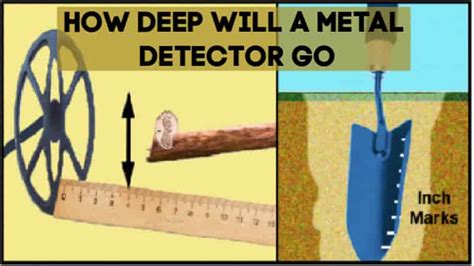How Deep Can Metal Detectors Go
Ronan Farrow
Apr 03, 2025 · 3 min read

Table of Contents
How Deep Can Metal Detectors Go? A Comprehensive Guide
Finding buried treasure or lost relics is a dream for many, and metal detectors are the tools that make this dream a reality. But how deep can these amazing devices actually detect metal? The answer, unfortunately, isn't a simple number. The depth at which a metal detector can successfully pinpoint a target depends on several interacting factors. Let's delve into the details.
Factors Affecting Metal Detector Depth
Several key elements significantly impact how far underground a metal detector can reach:
1. The Size and Type of Metal Object:
-
Size: Larger metallic objects, like a buried chest, naturally emit a stronger signal, allowing for deeper detection compared to smaller items like a lost earring. A larger surface area means a stronger electromagnetic field for the detector to pick up.
-
Type of Metal: Different metals possess varying conductivity levels. Highly conductive metals like gold and silver produce more robust signals, increasing the detection depth. Less conductive metals, such as iron, lead to shallower detection ranges.
2. The Type of Metal Detector:
-
Frequency: Metal detectors operate at different frequencies. Lower frequency detectors generally penetrate deeper into the ground but have lower resolution (meaning they can be less precise in pinpointing the location of a target). Higher frequency detectors are better for smaller and more precise targets but don't penetrate as deeply.
-
Coil Size: Larger search coils (the part of the detector that scans the ground) cover a wider area but might be less sensitive to depth. Smaller coils are more sensitive to smaller targets but don't reach as deep.
3. Ground Conditions:
-
Mineralization: The mineral content of the soil dramatically influences detection depth. Highly mineralized soil generates interfering signals, reducing the effective depth of detection. This is why detecting in areas with high concentrations of iron ore can be significantly more challenging.
-
Soil Type: Sandy soil is generally more conducive to deep detection than clay-rich soil, which offers more resistance to electromagnetic waves. Moisture content also plays a significant role – wet soil can interfere with signals, reducing effective depth.
-
Ground Temperature: Although less prominent than other factors, ground temperature can influence the electromagnetic field, creating minor variations in detection depth.
4. Metal Detector Settings:
-
Sensitivity: While increasing sensitivity can improve the detection of smaller or deeper objects, it can also result in more false signals from highly mineralized soil. Finding the optimal balance is key.
-
Ground Balancing: This crucial setting compensates for the effects of mineralization in the soil, minimizing interference and allowing for deeper detection in challenging environments.
Typical Detection Depths:
While providing specific numbers is impossible due to the variables above, here's a general guideline:
- Small objects (e.g., coins): A few inches to a foot, depending on the factors listed above.
- Larger objects (e.g., large metal objects): Several feet, potentially up to a few yards in ideal conditions.
Maximizing Detection Depth:
To enhance your metal detecting success and maximize depth:
- Research your target location: Understand the soil type and potential mineral content.
- Use a high-quality metal detector: Invest in a reliable machine with adjustable settings.
- Master your metal detector: Practice and learn how to interpret signals effectively.
- Use the appropriate coil size: Choose a coil size suitable for your target and ground conditions.
- Practice proper ground balancing: This is critical for minimizing interference.
By understanding these factors and employing best practices, you can significantly improve your chances of finding those elusive buried treasures, no matter how deep they may lie!
Featured Posts
Also read the following articles
| Article Title | Date |
|---|---|
| How To Vacuum Seal Bread | Apr 03, 2025 |
| How Big Is A Standard Card Table | Apr 03, 2025 |
| P1df3 How To Fix | Apr 03, 2025 |
| Bonsai Seeds How To Grow | Apr 03, 2025 |
| 3ft Hero Feeds How Many | Apr 03, 2025 |
Latest Posts
Thank you for visiting our website which covers about How Deep Can Metal Detectors Go . We hope the information provided has been useful to you. Feel free to contact us if you have any questions or need further assistance. See you next time and don't miss to bookmark.
